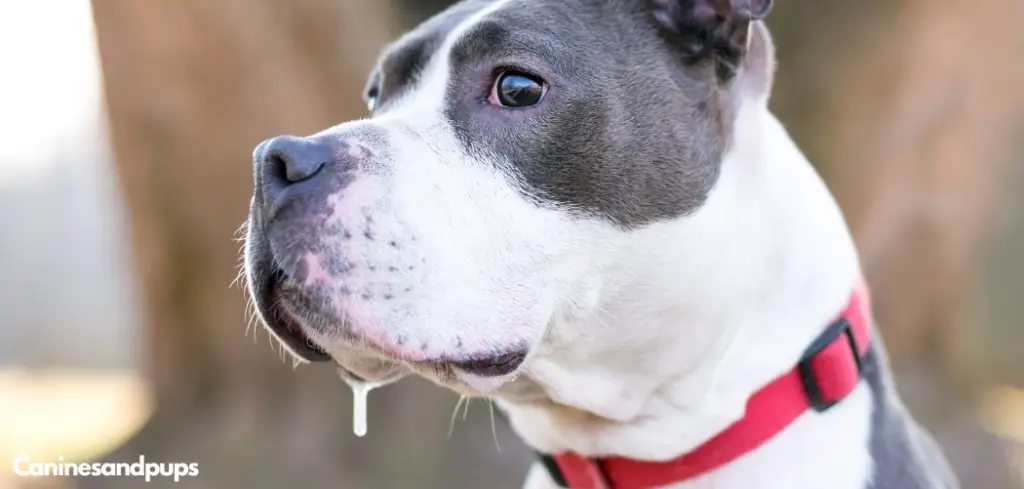Excessive drooling in dogs can be alarming, especially when it happens suddenly or in unusual situations.
While some drooling is normal for certain breeds, stress-related drooling can signal emotional distress or underlying health issues.
We outline the common causes of drooling in dogs due to stress, what you can do at home, and when to seek veterinary help.
Table of Contents
Dog Drooling Due to Stress — Why It Happens
Dog drooling due to stress happens because stress triggers physical changes in a dog’s body, including increased saliva production. This can be a result of anxiety, fear, unfamiliar environments, loud noises, separation from their owner, or travel. Stress activates the sympathetic nervous system, which can affect digestion, breathing, and salivation.
In some cases, drooling is an early warning sign that your dog is overwhelmed and struggling to cope.

Common Causes of Dog Drooling Due to Stress
Separation Anxiety
When left alone, some dogs experience intense anxiety. This emotional stress can cause them to pant, pace, bark excessively, and drool more than normal.
The drooling often starts shortly after you leave and may be accompanied by destructive behaviors or house soiling.
Chronic separation anxiety requires consistent management and, in some cases, professional help.
Read more: Dog Not Eating Due to Stress (Here’s why)
Travel and Motion Sickness
Car rides can be stressful for dogs, especially those not used to traveling. The combination of motion sickness and anxiety can significantly increase drooling.
Dogs may also pant, whine, or refuse to get in the car. This reaction is particularly common in puppies and rescue dogs with limited positive travel experiences.
Veterinary Visits
A trip to the vet can be a major stressor for many dogs. The unfamiliar smells, handling by strangers, and presence of other animals can cause heightened anxiety.
Drooling in this context is often paired with trembling, panting, or attempts to hide. Repeated stressful vet visits without positive reinforcement can make this reaction worse over time.
Loud Noises and Fireworks
Sudden loud noises, like thunderstorms or fireworks, can trigger a strong fear response. Stress hormones surge, causing physical signs like drooling.
Your dog might also try to hide, pace, or stick close to you during these events. This type of stress-induced drooling typically subsides once the noise stops, but repeated exposure can lead to ongoing anxiety.
New Environments or Social Situations
Dogs encountering new places, people, or animals may feel overwhelmed. Stress from unfamiliar surroundings can manifest in drooling, along with alert body language and cautious behavior.
This can happen during dog park visits, walks in busy areas, or when guests come over. Building your dog’s confidence with gradual exposure can help reduce these reactions.
Underlying Medical Conditions Worsened by Stress
Sometimes, drooling isn’t just about emotional stress. Conditions like dental disease, nausea, or throat irritation can worsen when a dog is stressed.
In these cases, stress acts as a trigger, amplifying the symptoms. If drooling continues outside of stressful situations, a medical evaluation is necessary.
What to Do If Your Dog Is Drooling Due to Stress
Start by identifying and removing or reducing the stressor whenever possible. For example, create a quiet, safe space during fireworks or thunderstorms.
Provide comfort and reassurance without reinforcing fearful behavior. Calm presence, gentle petting, and speaking in a soothing tone can help.
For travel stress, acclimate your dog to the car gradually, starting with short, positive trips. Offer treats and praise to create positive associations.
Enrichment activities like puzzle toys or scent games can redirect focus and reduce stress levels. Regular exercise also plays a big role in maintaining emotional balance.
If stress drooling is frequent or severe, consult a veterinarian or certified dog behaviorist. They can suggest behavior modification strategies or, in some cases, anti-anxiety medications.
When to Call or Visit Your Vet
If drooling happens alongside vomiting, difficulty swallowing, pawing at the mouth, or changes in appetite, call your vet immediately. These could be signs of poisoning, oral injury, or illness.
Seek urgent help if drooling is accompanied by collapse, disorientation, or extreme lethargy. This could indicate a serious medical emergency.
Even if the drooling seems purely stress-related, persistent or worsening symptoms should be checked by a vet to rule out hidden health problems.
Read more: Dog Coughing Due to Stress (Why it happens)
Key Takeaway
Stress-induced drooling can be unsettling, but it’s often a sign your dog needs comfort, reassurance, or a calmer environment. Identifying the triggers and addressing them early helps prevent prolonged anxiety.
Monitor for any signs that could indicate illness, and don’t hesitate to involve your veterinarian if the drooling is severe, persistent, or accompanied by other symptoms.
With patience and the right support, most dogs can overcome stress-related drooling and return to a happier, more relaxed state.
